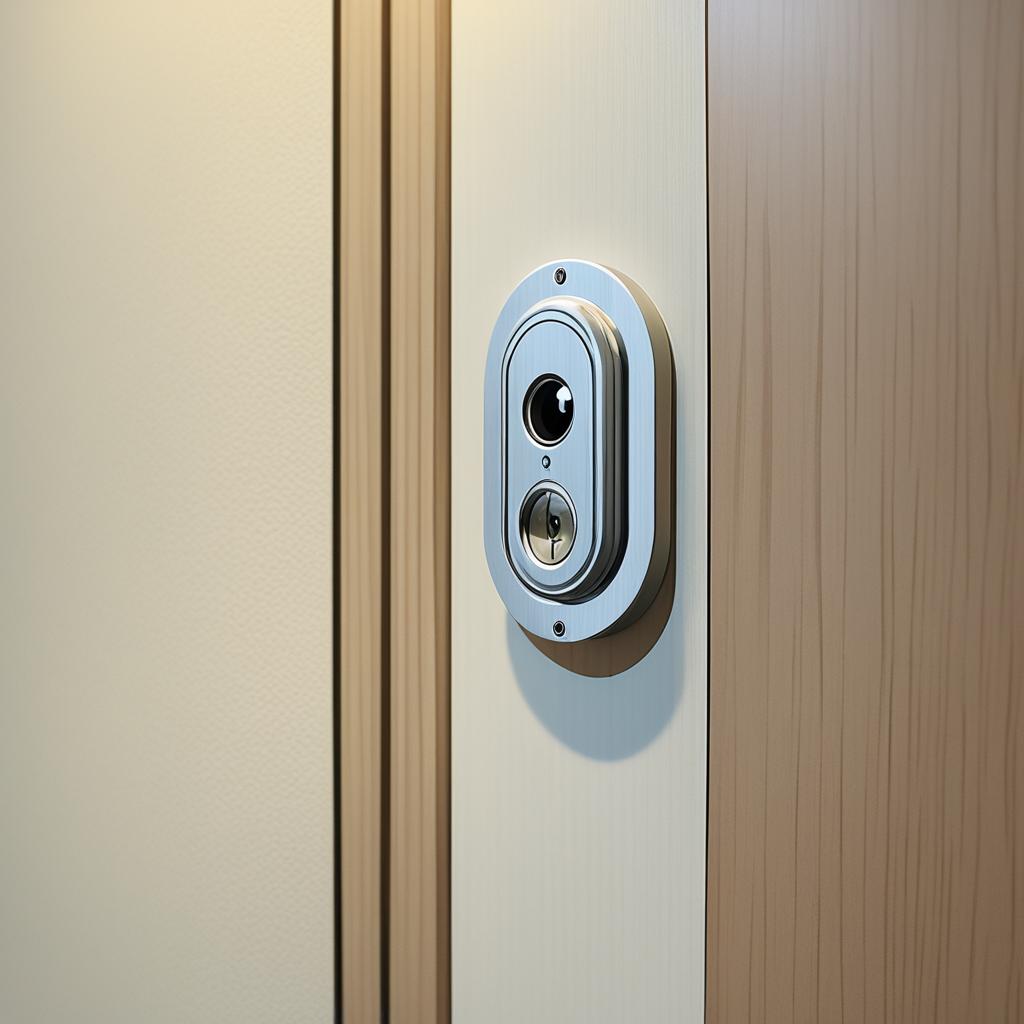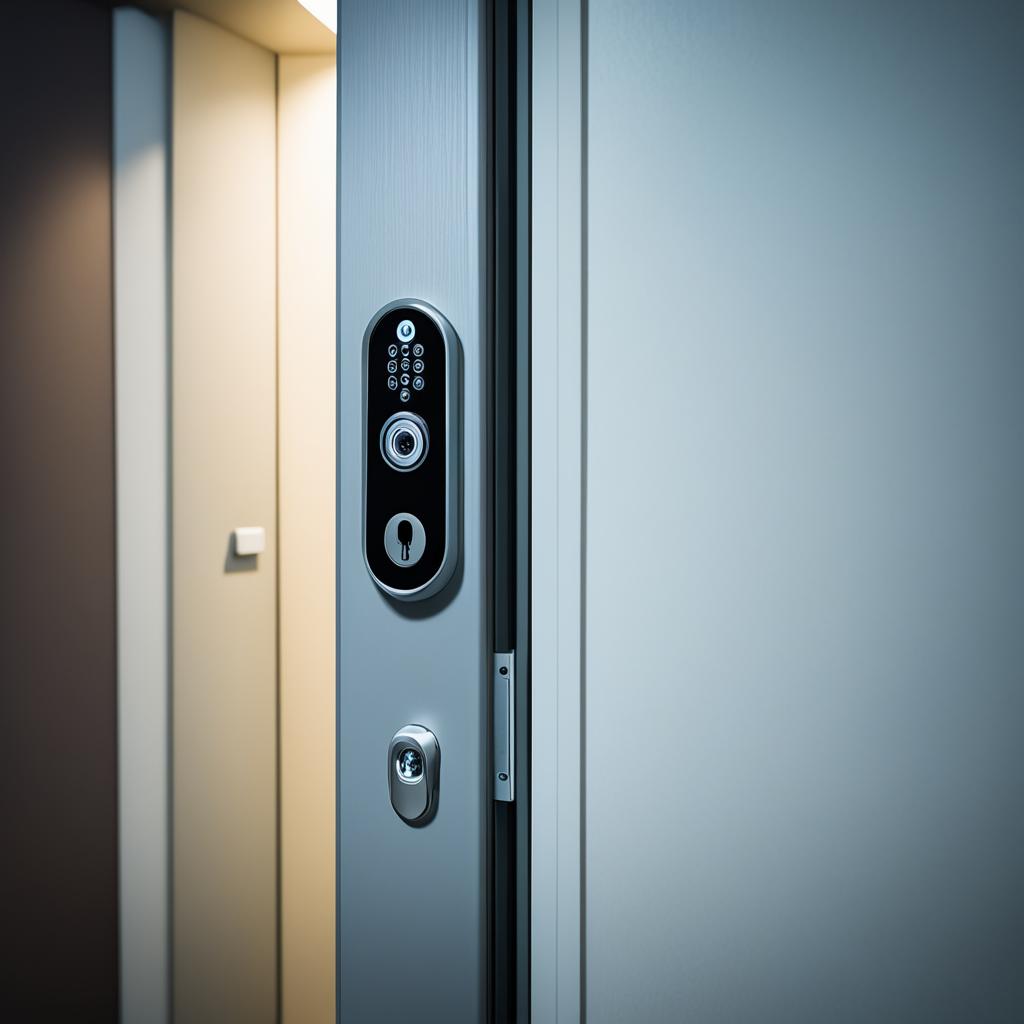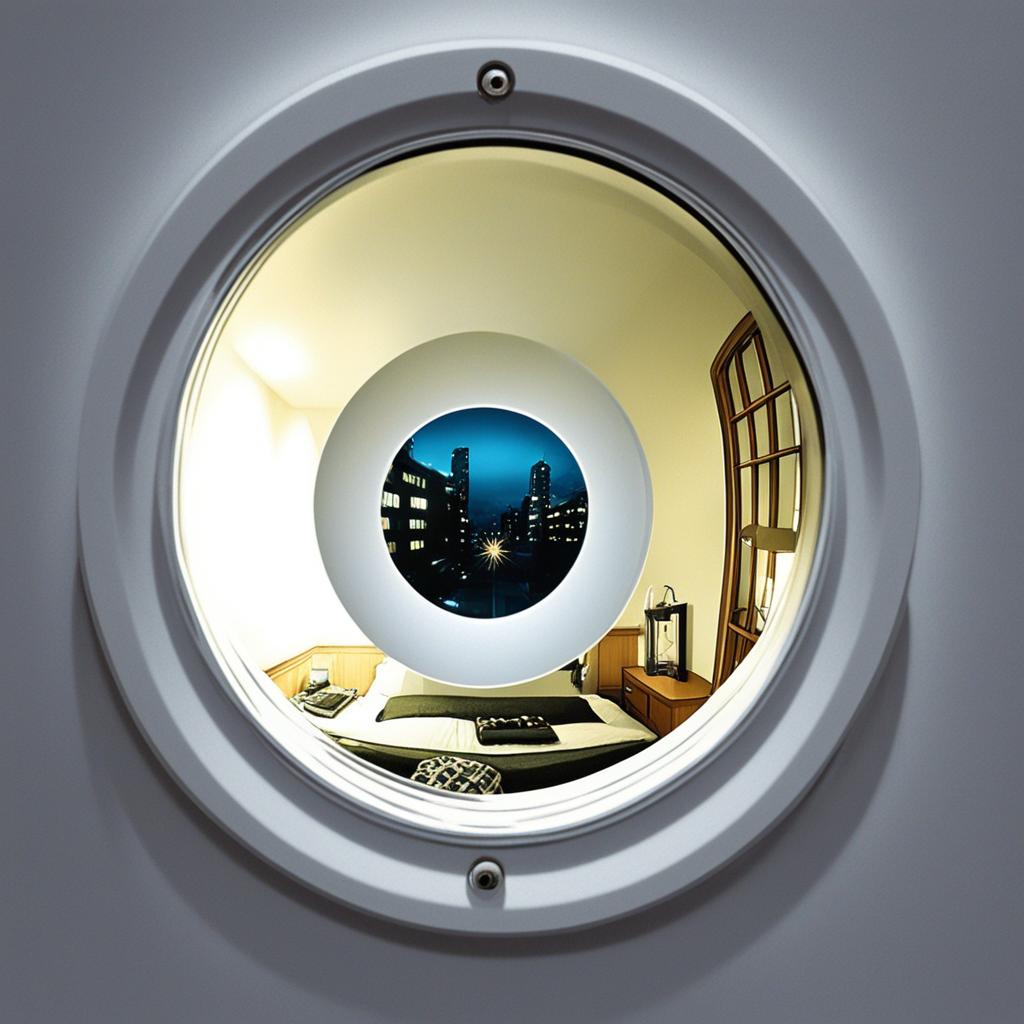When you check into a hotel room, have you ever wondered why there’s a small peephole in your door? It may seem like a simple and inconspicuous feature, but it serves a crucial purpose in ensuring your safety and security during your stay.
Peepholes are an integral part of hotel room security, providing you with a much-needed line of defense against potential threats. They allow you to discreetly observe who is outside your door without fully opening it, giving you the opportunity to verify identities and make informed decisions about allowing access.
But why are peepholes necessary in hotels? Do they really make a difference in guest safety? In this article, we will explore the various reasons why hotels have peepholes and how they contribute to your overall security and peace of mind.
Join us as we delve into the world of hotel room security, uncovering the importance of privacy, enhancing security measures, controlling noise, maintaining climate, and meeting safety standards. Discover the efforts hotels take to ensure your safety and learn how you can make the most of these security features during your hotel stays.
The Importance of Privacy in Hotel Rooms

Hotel room doors play a crucial role in providing guests with privacy during their stay. The presence of a door allows guests to establish a personal sanctuary within the larger hotel environment. It visually separates the guest’s private space from the common areas, creating a sense of comfort and security. The door serves as a physical barrier to prevent unwanted intrusions and provides a visual cue that the room is a private area for guests to relax and unwind.
When you enter your hotel room, you step into a space that is exclusively yours. It becomes your personal retreat where you can escape from the outside world and enjoy a moment of solitude. The closed door acts as a boundary, creating a psychological barrier that gives you a feeling of control and ownership over your temporary living space.
Not only does a closed door offer a physical barrier, but it also acts as a visual cue to others that your room is off-limits. It signals that the space beyond the door is your personal domain, respecting your need for privacy and allowing you to feel more at ease.
Hotel room privacy is essential for numerous reasons, including:
- Providing a sense of security and comfort
- Allowing guests to relax and unwind without the fear of being disturbed
- Creating a space for personal activities, such as getting ready for the day or working in privacy
- Preserving confidentiality during business trips or intimate moments
Hoteliers understand the importance of privacy and strive to ensure that guests’ rooms remain their own personal sanctuaries. By prioritizing privacy, hotels can create an environment where guests feel safe, secure, and respected.
| Benefits of Hotel Room Privacy |
|---|
| 1. Enhanced sense of security |
| 2. Peaceful and uninterrupted relaxation |
| 3. Increased productivity and focus |
| 4. Confidentiality and privacy for personal activities |
The image above depicts a serene hotel room, highlighting the importance of privacy in creating a personal sanctuary for guests.
Enhancing Security Measures in Hotel Rooms

When it comes to hotel room security, hotel doors play a crucial role in ensuring the safety of guests. These doors are designed with advanced features and sturdy materials to prevent break-ins and unauthorized access.
Hotel doors are equipped with state-of-the-art locking mechanisms, such as deadbolts and electronic key card systems. These systems ensure that only authorized individuals can enter the room, providing an additional layer of security.
The durability of hotel doors is also paramount to preventing forced entry. They are made with tough materials and reinforced with metal plates and hinges, making it extremely difficult for intruders to gain access.
Moreover, hotels take additional security measures to enhance the safety of their guests. One such feature is the installation of peepholes, which allow guests to see who is outside their door before opening it. This helps verify identities and prevent potentially dangerous situations.
Additionally, many hotels employ security personnel who monitor the premises and ensure the well-being of guests. These trained professionals provide an added sense of security and act as a deterrent to potential break-ins.
| Security Measures | Description |
|---|---|
| Locking Mechanisms | Deadbolts and electronic key card systems restrict access to authorized individuals. |
| Durable Materials | Hotel doors are made with sturdy materials, reinforced with metal plates and hinges, to prevent forced entry. |
| Peepholes | Peepholes allow guests to verify identities and see who is outside their door before opening it. |
| Security Personnel | Trained security personnel are present to monitor the premises and ensure guest safety. |
By implementing these security measures, hotels strive to provide a safe and secure environment for their guests. The combination of advanced locking mechanisms, durable materials, peepholes, and security personnel works together to prevent break-ins and enhance guest peace of mind.
Ensuring the safety and security of hotel rooms is a top priority for hotels. Implementing these security measures allows guests to have a worry-free stay, knowing that their well-being is being safeguarded.
Noise Control in Hotel Rooms

When it comes to enjoying a peaceful stay in a hotel, one of the crucial factors that contribute to guest satisfaction is noise control. Hotel room doors play a significant role in minimizing the transfer of sound and creating a quiet environment for guests to relax and sleep peacefully.
Hotel room doors are carefully designed and constructed using materials that have soundproofing properties. These materials help to reduce noise transmission between rooms, ensuring that guests are not disturbed by sounds coming from adjacent areas. The thickness and density of the door, along with the seals around its edges, all work together to minimize sound transfer and create a serene atmosphere inside the room.
In addition to reducing noise transmission between rooms, hotel room doors also play a crucial role in blocking noise from the hallways. This ensures that any noise generated outside the room, such as conversations or footsteps, is kept to a minimum, further enhancing the tranquility of the guest’s stay.
Benefits of Soundproofing:
- Enhanced relaxation and peaceful sleep
- Improved focus and productivity for business travelers
- Reduced stress and fatigue
- Enhanced overall guest satisfaction
By prioritizing noise control, hotels aim to create a calm and comfortable environment, allowing guests to have a truly rejuvenating experience during their stay.
| Noise Control Measures | Benefits |
|---|---|
| Soundproof hotel room doors | Minimized noise transmission from adjacent rooms |
| Seals and weather-stripping | Reduced noise from the hallways and outside the room |
| Insulated walls and windows | Additional noise reduction |
Climate Maintenance in Hotel Rooms
When it comes to hotel room comfort, temperature control plays a vital role in ensuring a pleasant stay for guests. Hotel room doors play a crucial part in maintaining the desired climate inside the room.
Properly insulated doors are key to preventing temperature imbalances and maximizing energy efficiency. By keeping the heat or air conditioning inside, they create a comfortable environment that guests can customize to their liking.
One of the main advantages of well-insulated doors is their ability to prevent air leaks. These leaks can lead to drafts, temperature fluctuations, and ultimately, an increase in energy consumption. With properly sealed doors, hotels can optimize energy efficiency and offer guests a more sustainable and eco-friendly experience.
Weather-stripping is another important feature that enhances climate control in hotel rooms. It helps to seal any gaps around the door, preventing drafts from entering the room. By keeping the outside air out and the inside air in, weather-stripping contributes to a consistent and comfortable temperature, enhancing the overall guest experience.
Providing guests with a comfortable climate is a top priority for hotels. By investing in properly insulated doors and efficient weather-stripping, hotels can ensure that guests enjoy a pleasant stay while also reducing energy consumption and promoting sustainability.
| Benefits of Climate Maintenance in Hotel Rooms |
|---|
| 1. Enhanced guest comfort and satisfaction |
| 2. Reduced energy consumption and cost savings |
| 3. Improved sustainability and environmental footprint |
| 4. Consistent and pleasant temperature throughout the stay |
Meeting Safety Standards in Hotel Rooms
When it comes to hotel room safety, hotels prioritize meeting safety standards and regulations to ensure the well-being of their guests. This includes compliance with fire code requirements and accessibility standards to provide a secure and accessible environment for all visitors.
Fire code compliance is a critical aspect of hotel room safety. Hotels install fire alarms, sprinkler systems, and use fire-resistant materials to reduce the risk of fire-related incidents. These measures are designed to quickly detect and suppress fires, allowing guests to safely evacuate in case of an emergency.
Furthermore, hotel rooms also adhere to accessibility requirements to ensure wheelchair accessibility and accommodations for guests with disabilities. This includes features such as wider doorways, grab bars in bathrooms, and accessible room layouts. Hotels strive to create an inclusive environment where all guests can navigate and enjoy their stay comfortably.
By meeting these safety standards, hotels demonstrate their commitment to guest safety and provide peace of mind to their visitors. Whether it’s a fire emergency or the need for accessible facilities, hotels prioritize the safety and well-being of their guests, ensuring they have a safe and enjoyable stay.
<!–
| Fire Code Compliance | Accessibility Requirements |
|---|---|
| Installation of fire alarms, sprinkler systems, and fire-resistant materials | Wheelchair accessibility, wider doorways, grab bars, accessible room layouts |
–>
Conclusion
When it comes to hotel room security measures and guest safety in hotels, peepholes are just one of the many important components. Alongside advanced door locks, noise control mechanisms, climate maintenance systems, and compliance with safety standards, peepholes play a crucial role in ensuring a safe and secure stay for guests.
By providing privacy and preventing unauthorized entry, peepholes give guests the ability to verify identities before fully opening the door, adding an extra layer of security and peace of mind. They also contribute to noise control, minimizing disruptions from hallways and neighboring rooms, allowing guests to enjoy a peaceful and restful stay.
Moreover, peepholes, along with other security measures, help to maintain a comfortable climate inside the hotel room. By preventing air leaks and drafts, they contribute to temperature control and energy efficiency, ensuring guests have a pleasant environment throughout their stay. Additionally, hotels invest in meeting safety standards and accessibility requirements to prioritize the safety and well-being of all guests.
As a guest, it is important to be aware of and utilize these security measures to enhance your safety and overall experience during your stay. Hotels take guest safety seriously and strive to create a secure environment where you can relax and enjoy your time. So, the next time you check into a hotel, remember to take advantage of the peephole and other security features available to ensure a safe and comfortable stay.
FAQ
Q: Why do hotels have peepholes?
A: Peepholes in hotel rooms serve an important purpose by enhancing guest safety and security. They allow guests to see who is outside their door without fully opening it, providing a way to verify identities and avoid potential threats.
Q: What is the importance of privacy in hotel rooms?
A: Hotel room doors play a crucial role in providing guests with privacy during their stay. The presence of a door allows guests to establish a personal sanctuary within the larger hotel environment. It visually separates the guest’s private space from the common areas, creating a sense of comfort and security.
Q: How do hotel room doors enhance security?
A: Hotel room doors are designed to enhance security and ensure the safety of guests. They are equipped with advanced locking mechanisms, such as deadbolts and electronic key card systems, to restrict access to authorized individuals. Hotel doors are made of durable materials, reinforced with metal plates and hinges, to prevent forced entry.
Q: How do hotel room doors control noise?
A: Hotel room doors are designed to minimize the transfer of sound and provide a barrier against noise. They are constructed with materials that have soundproofing properties to reduce noise transmission between rooms. The thickness, density, and seals around the edges of the door contribute to minimizing sound transfer.
Q: How do hotel room doors maintain the climate inside the room?
A: Hotel room doors play a role in maintaining the climate inside the room. They help to keep the heat or air conditioning inside, ensuring a comfortable environment for guests. Properly insulated doors prevent air leaks, which can lead to temperature imbalances and increased energy consumption.
Q: What safety standards do hotel room doors meet?
A: Hotel room doors are designed to meet safety standards and regulations. They comply with fire code requirements, including the installation of fire alarms, sprinkler systems, and fire-resistant materials. Hotel rooms also adhere to accessibility requirements, ensuring wheelchair accessibility and accommodations for guests with disabilities.
Q: Conclusion
A: Peepholes, along with other security measures, are essential components of hotel room design. They enhance guest safety by providing privacy, preventing unauthorized entry, controlling noise, maintaining climate, and meeting safety standards. Hotels strive to create a secure environment for their guests, prioritizing their safety and peace of mind.
